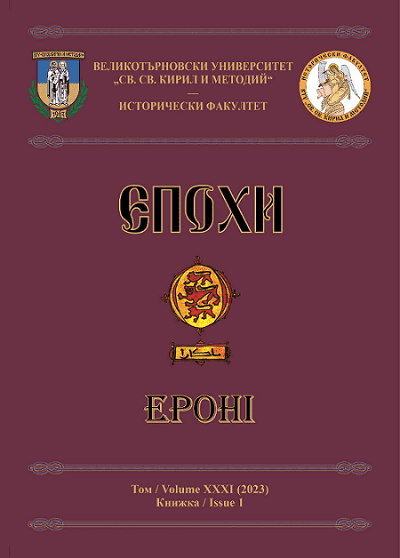Неясните изрази в първобългарския надпис от Преслав
The Unclear Phrases in the Proto-Bulgarian Inscription from Preslav
Author(s): Veselin KandimirovSubject(s): History, Language and Literature Studies, Theoretical Linguistics, Local History / Microhistory, Middle Ages, Historical Linguistics, 6th to 12th Centuries
Published by: Великотърновски университет „Св. св. Кирил и Методий”
Keywords: Proto-Bulgarian language; Proto-Bulgarian inscriptions; Preslav inscription; Byal Bryag inscription
Summary/Abstract: The Preslav inscription (9th century) is one of the very rare texts in Proto-Bulgarian language written in Greek letters. Its first publisher – Venedikov, assigns it to the so-called “lists of armaments”, written in Greek stone inscriptions from the First Bulgarian Empire, which include varying numbers of armours and helmеts along with the persons responsible for them. The decipherment so far has revealed three types of armours and the names of two persons responsible for them (mentioned with their posts) in the inscription. The following phrases remain unclear: – ζητκω (as an adjective of ητζηργωυ βωυλε); – τωυρτωυναπηλε; – εστρογην / εστρυγην (as an adjective of κυπε); – χλωυβρην. In this article, they are deciphered through old Turkic, and the following translation is proposed: ζητκω corresponds to the old Turkic ‘sıtğa-‘ (‘to roll up sleeves’), but figuratively it means ‘preparing (to do something)’. The phrase τωυρτωυναπηλε is separated into words and is transcribed as follows: ‘turt una pilä’. ‘Turt’ is a causative in the old Turkic verb ‘tur’ – ‘to stand’, ‘to remain, stay, halt’, ‘is, exist’. Thus, ‘turt una’ means ‘required to be present here in this moment’. Pilä is the old Turkic ‘bilä’, or ‘with, together.’ On the basis of this translation, we can postulate that this inscription is not a list of arms but a mobilization list. It shows the number of soldiers who had to appear before the person who was to be their commander in case of mobilization – ‘ichirgü boyla’ (inner boyla). This list was kept in a place with a permanent garrison described as ‘turt una.’ The person carrying the title of ‘zupan’ was responsible for the staff of the garrison. Here, the separate types of weapons mean different types of troops. The term χλωυβρην should be understood as something belonging to the qualbur, or ‘mage, priest’. It remains unclear how the chainmail marked with εστρùγην/εστρυγην κυπε is to be translated. The first Danube Bulgarian word is most likely a loanword from an Indo-European language. -ην is a suffix, and the Indo-European root of the word should be ‘strog-‘ or ‘strig-‘.
Journal: Епохи
- Issue Year: XXXI/2023
- Issue No: 1
- Page Range: 66-74
- Page Count: 9
- Language: English, Bulgarian, Old Bulgarian, Greek, Modern (1453-)

